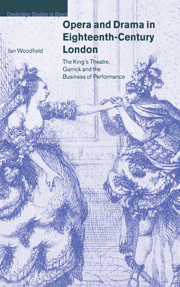 Opera and Drama in Eighteenth-Century London
Opera and Drama in Eighteenth-Century London Book contents
- Frontmatter
- Contents
- List of tables
- List of musical examples
- Acknowledgements
- A note on conventions
- Introduction
- 1 The Hobart management
- 2 The new managers take control
- 3 Sacchini and the revival of opera seria
- 4 Recruitment procedures and artistic policy
- 5 The King's Theatre in crisis
- 6 The recruitment of Lovattini
- 7 The English community in Rome
- 8 Lucrezia Agujari at the Pantheon
- 9 Caterina Gabrielli
- 10 Rauzzini's last season
- 11 The King's Theatre flourishes
- 12 The Queen of Quavers satire
- 13 Financial management
- 14 Opera salaries
- 15 The sale of 1778
- Appendices
- Notes
- Bibliography
- Index
12 - The Queen of Quavers satire
Published online by Cambridge University Press: 22 September 2009
- Frontmatter
- Contents
- List of tables
- List of musical examples
- Acknowledgements
- A note on conventions
- Introduction
- 1 The Hobart management
- 2 The new managers take control
- 3 Sacchini and the revival of opera seria
- 4 Recruitment procedures and artistic policy
- 5 The King's Theatre in crisis
- 6 The recruitment of Lovattini
- 7 The English community in Rome
- 8 Lucrezia Agujari at the Pantheon
- 9 Caterina Gabrielli
- 10 Rauzzini's last season
- 11 The King's Theatre flourishes
- 12 The Queen of Quavers satire
- 13 Financial management
- 14 Opera salaries
- 15 The sale of 1778
- Appendices
- Notes
- Bibliography
- Index
Summary
Even before the start of the final season at the King's Theatre, the Brooke-Yates management team was considering a return to the theatrical world. Early in 1777 Richard Yates applied for a licence to open a theatre in Birmingham, and a bill to this effect was presented in the House of Commons on 26 March. It was scheduled for discussion on 22 April. Garrick, who had been lobbying for Yates, wrote to Edmund Burke to thank him for his support. Burke had been sympathetic at first ‘despite a very powerful recommendation’ from some of his constituents, and he sided with Yates, but, in the face of direct pressure from a group of his supporters with Birmingham connections, he was pressured into adopting a more neutral stance. He nevertheless reassured Garrick about the outcome: ‘But I believe, as far as I can see, that Yates is in no great danger. The House seems to be with him; & assuredly I do not mean to be a very mischievous Enemy to him.’ Garrick replied: ‘Ten thousand thanks my dear Burke for Your very kind letter – God forbid that all ye Patents in the World should injure Your Interest, where you are so much in Duty and kindness [bound].’ After the debate, however, the bill was defeated.
- Type
- Chapter
- Information
- Opera and Drama in Eighteenth-Century LondonThe King's Theatre, Garrick and the Business of Performance, pp. 166 - 181Publisher: Cambridge University PressPrint publication year: 2001
